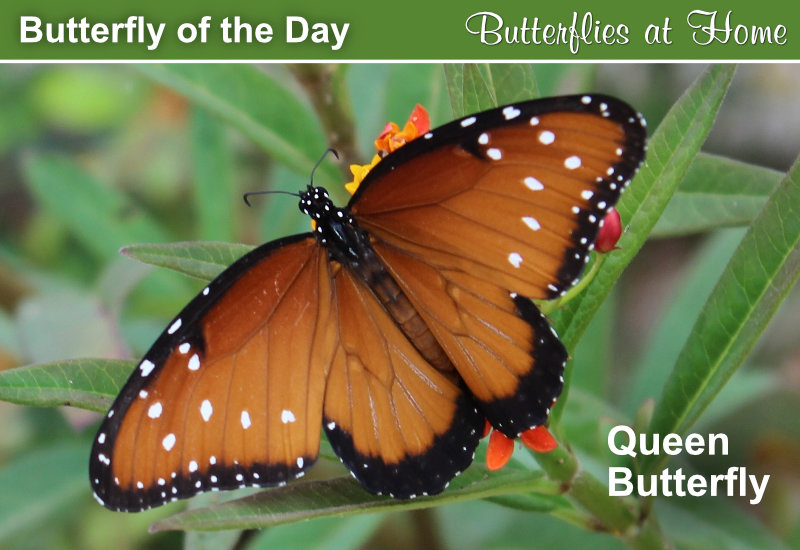Welcome!
 |
This website presents highlights of common butterflies as an entry-level learning and reference resource for those interested in these beautiful creatures!
Information is included on butterflies and moths you might find around your home, along with photographs, geographic distribution, host plants and more.
We love watching butterflies, whether we are home or traveling around the country to national parks, nature preserves, or hiking trails. Any state or province is a great location for discovering these magnificent creatures.
As we deal with the cold days of winter in 2026, we reflect back on the memories of all the wonderful butterflies we have seen throughout the past year around our gardens!
Butterfly Species
It is estimated that there are about 20,000 species of butterflies in the world. In North America, there are 725 species (north of Mexico), with about 575 of these occurring regularly in the lower 48 states of the United States.
Included on this website are some of the more common butterflies and moths found in backyard gardens, home landscapes, residential areas, nearby parks and along roadsides in North America.
For more information, view our coverage of over 150 common butterflies.
What Kind of Swallowtail Is It?
Several species of swallowtails are predominantly black with similar yellow and blue markings, and identification is often difficult. Many of our readers have asked for an easy-to-use identification tool for swallowtails.
We've developed a page to help our website visitors identify Swallowtail butterflies.
Butterflies of the World
This website is viewed by many around the world who have an interest in butterflies, and have shared their photos with us! Many of the species discussed on this website are found not only in North America, but on other continents as well.
We've had photos submitted from multiple locations in the the United Kingdom, such as London, Plymouth, Kent, South Ockendon, Northhampton, Manchester, and Lincolnshire. And we have viewers in Ireland, Scotland, Australia, India and Bangladesh who have shared beautiful photos with us.
Take a look at our butterfly photos from international viewers
Identifying Butterflies
We have also added a series of articles to help identify butterflies by primary color ... is it yellow, white, brown, green, blue or ??
Many of our views ask ... Is it a butterfly or a moth? And we answer on our Butterflies FAQs page questions about the life cyle of butterflies and common caterpillars.
Read our special edition about Texas Butterflies ... species, ecological environments, Texas nature centers, and more.
Butterfly Gardening
We also enjoy butterfly gardening, and designing our landscape to provide food and shelter for a variety of butterflies.
Our butterfly garden features a number of different ecological environments. Located in the country, it backs up to hundreds of acres of forest, with nearby fields, pastures, and wetlands. It is registered by MonarchWatch.org as a certified Monarch Waystation.
We've included in our landscape several types of Lantana, Zinnias, Pentas, Salvia, Batface Cuphea, Firebush and other butterfly-friendly plants, annuals and perennials. We also plant dill and fennel to provide food sources for Black Swallowtails. Learn more about butterfly gardening
Butterflies at Home: Trending Today! |
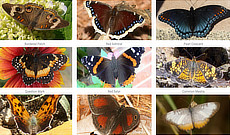
Species
Butterflies and moths belong to a group of insects called Lepidoptera. Like all insects, butterflies and moths have a head, thorax, abdomen, two antennae, and six legs. There are many more species of moths than butterflies. It is estimated that there are about 20,000 species of butterflies in the world. In North America, there are 725 species (north of Mexico), with about 575 of these occurring regularly in the lower 48 states of the United States.
READ MORE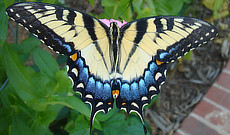
Swallowtails
This magnificent family (Papilionidae) of large butterflies is loved by many, and includes more than 600 species worldwide. Most of these large, brightly colored butterflies feature tails on their hind wings. These tail-like appendages resemble the tails of swallow family of birds, hence their name. However, some, like the Indra and Polydamus, do not have tails. Several species of Swallowtails are predominantly black, and share similar yellow, blue and orange markings. Identification is often difficult.
READ MORE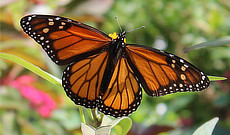
The Monarch
The Monarch is perhaps the best known and most loved butterfly in North America. This large, orange and black butterfly can be seen across the country in backyards, parks and fields.The Monarch is a large butterfly, with no tails. It has rich orange coloration with black veins, and white spots on the black wing borders and on the body. Males have small, black scent glands on vein in the center of hind wings. Females have thicker black veins.
READ MORE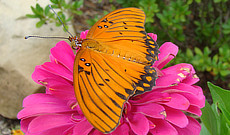
Butterfly Gardening
Butterflies, like birds and other animals, need food, water, and shelter, the basic necessities of life. In addition, butterflies like direct sunlight, and heat. A good butterfly garden should provide both sunny places and shady places where butterflies can cool off while they eat. They also need shelter from wind, and inclement weather.
READ MORE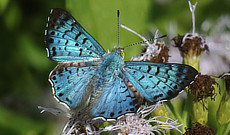
ID by Color
Identification of hundreds of species of butterflies can be difficult! One way to identify common butterflies is starting with their primary color. We've included on this website six pages that focus on butterflies that are blue, orange, black, brown, yellow or white.
READ MORE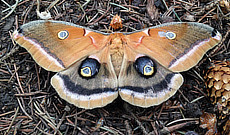
Moths
A moth is an insect related to the butterfly, both being of the order Lepidoptera. There are an estimated 160,000 species of moth, about 10 times the number of species of butterfly. In general, moths tend to be stockier and have furry bodies, whereas butterflies are smooth and lean. Butterflies tend to fold their wings vertically up over their backs, while moths hold their wings in a tent-like fashion hiding the abdomen.
READ MORE
Enjoy the website, and visit again for another fun season of watching butterflies in 2026 !


